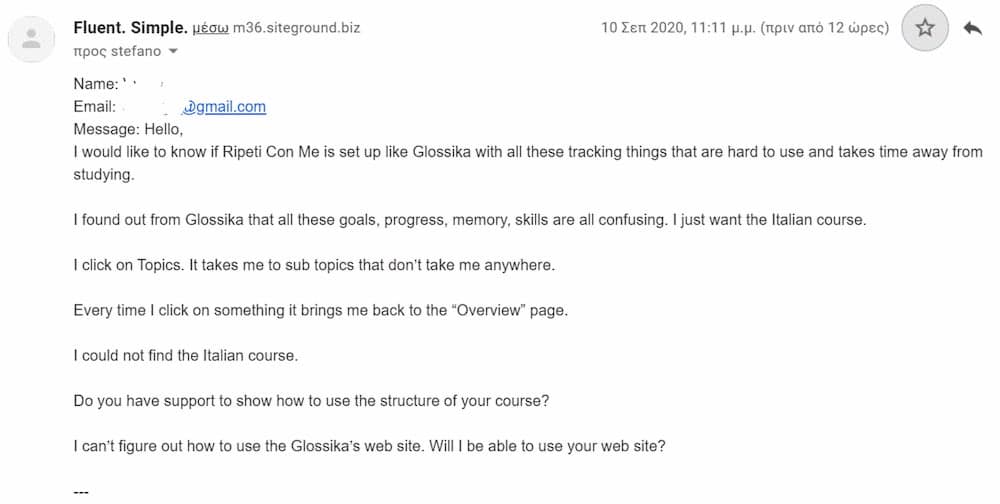What makes a good method of learning a language?
To me, a study method is good if it delivers results.
Typically, people want to learn Italian to communicate. Thus, progress in communication skills is what makes an effective study method.
After studying 12 languages, I know for sure that the best way to learn a language is by speaking – listening, and mimicking native speakers.
As a beginner, this means taking expensive classes with professional tutors.
A more affordable second-best solution is self-study with resources that try to replicate a conversation with a native speaker.
However, there’s a plethora of apps and courses out there that just don’t get you to practice speaking while they make you addicted to using them.
Some interesting insight comes from an inquiry I received some time ago (Glossika is a popular language app):

The bad methods underlying those materials include:
- Memorizing grammar rules
- Translating in your head
- Memorizing wordlists with flashcards
- Silent reading
- Quietly solving quizzes like with Duolingo
- Distracting you with statistics and rankings
- Giving you a false sense of achievement
Why are bad methods and bad resources still so popular among students, teachers, and app makers?
To explain that, I’ll draw a parallel with a singing technique based on my experience as an operatic tenor.

A parallel with singing technique
To sing opera, you need a solid technique, achievable after years of daily practice under the guidance of an experienced vocal coach.
There’s a different singing technique and a teaching method for every teacher. Some give excellent results, while others don’t really teach anything, and others even end up harming vocal cords.
Since opera has been around for centuries, you might think that we sing better now than we used to sing before, but that’s not the case.
The overall level of singing technique reached a golden age around the mid-20th century and dropped significantly. Just ask an opera buff, and they’ll tell you that opera singers nowadays are not what they used to be.
There are many reasons for this, but I’ll only mention those that I need to draw a comparison with language learning:
- Singing teachers are jealous of their method
- Singing teachers are skeptical of others’ methods
- Singing students keep their best guidance secret from other students to maintain an edge over them
- Since it’s hard to judge objectively by yourself if a technique is working on you, students end up believing in bad techniques and teachers, as in a religious sect.

Why bad methods are hard to die
There are many reasons why bad language learning and teaching methods are still popular.
Some depend on learners, others on teachers, and app or course makers (service providers).
Familiarity from school
Many people study at least one foreign language at school without being able to speak it, mainly because the teaching methods are skewed toward grammar and translation.
And also, because there’s just not enough time to practice speaking in a 30-student class.
Skeptical students
If you’re used to what you did at school, you can’t even think of a fundamentally different way to learn.
That’s why people feel anxious when they can’t find a 1-to-1 translation or miss a word, or don’t understand a grammar rule.

Cognitive dissonance
Admitting that there’s a better way to learn also means that what you’ve done so far was wrong.
That’s why many casual learners prefer to rationalize: “he can’t learn so easily because he’s talented, I’m too busy, etc.”
Too simple to be true
Indeed, the best way of learning – listening and mimicking – sounds too simple to be true.
After all, we follow grammar rules, and linguists spend their lives studying how languages work. That knowledge must be necessary, right?
Skeptical teachers
Older generations of teachers are just happy with the translation-grammar method used in schools.
Typically, these teachers are not fluent in any foreign language.
Marketing claims
“Master Italian in 3 months!”
“Memorize thousands of words with flashcards!”
“Learn while sleeping!”
I only wish that the marketing claims of language-learning apps were only vaguely realistic…
If you set such unrealistic expectations, there’s just no learning resource that can help you meet them.
Affiliate programs
Many language apps offer juicy affiliate rates to popular bloggers and website owners who promote their products.
That’s the case of all major providers you know, like Rocket Languages or Rosetta Stone.
Affiliate marketing is not bad per se, but when the commission is so high, you just want to push that product even if there are better options.

Misleading courses
Modern language apps are not made to be effective.
They’re made to be addictive.
Since many language learners fail because they lack motivation and give up, it’s not a bad idea to keep them running.
However, language apps continuously flatter you with trivial means like avatars, points, and badges just to keep you stuck to the screen, whether you’re making progress or not.
Authority
Some courses have an impressive range of languages taught and have been around for decades.
For example, I don’t know why Rosetta Stone is still around. It made sense when I was in high school, but now there are better and cheaper alternatives.
On the internet, it’s easy to build a brand with a relatively small marketing budget (but certainly larger than mine!) and look popular with dubious reviews.
Give it a try!
I hope that, after this insight into the dynamics of language learning products and consumers, you know what to expect from and how to choose your next Italian language course.
I’m talking about Impara Con Me, the plan for full access to the audio lessons Ripeti Con Me, and the readings Leggi Con Me.
This material is excellent to listen to and mimic an Italian native speaker (me). Besides, you can practice what you’ve learned, ask questions, and communicate with other students using the community forum.
Start a free trial today!









